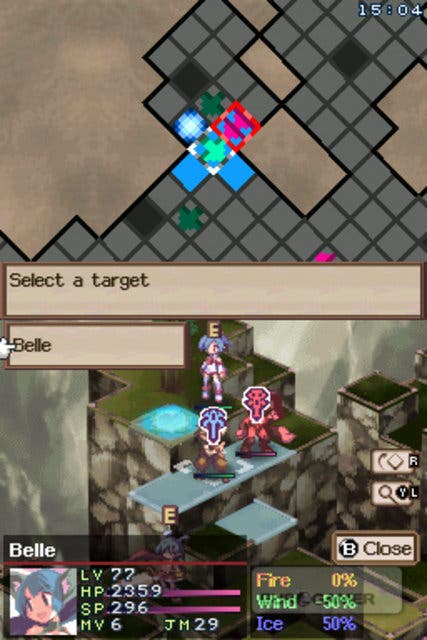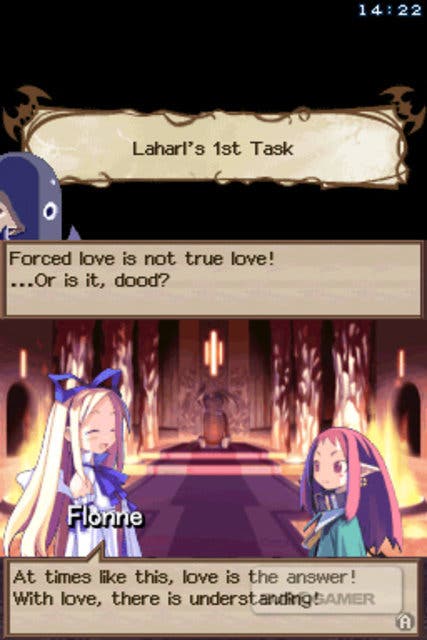Disgaea DS
But not dat guy dere.
Your reaction to this latest offering from the Disgaea series will depend on your previous exposure to Nippon Ichi's deliciously daft world. If you played the original Disgaea: Hour of Darkness on the PS2, or its 2006 PSP port, Afternoon of Darkness, you'll probably be saying "Oh, it's you again, you haven't changed much." Because, really, it hasn't. This is exactly the same as the PSP version in almost every respect with only a few minor changes - the loss of the Japanese audio track, for example - to accommodate the smaller memory of the DS cartridge.
However, if you've never played Disgaea before - entirely likely given the series is a quintessential example of a critically acclaimed Japanese cult that has sunk without trace in the west - your reaction will hopefully be, "Ooh, you look interesting, what do you do?"
What it does is strategic role-playing in the style of Final Fantasy Tactics, Fire Emblem and Tactics Ogre. Our hero is Laharl, a demon of the Netherworld who wakes from a two-year nap to learn his father, overlord of this hellish domain, has died. Various demons are now battling to fill the power vacuum and Laharl, outraged that people are squabbling over his birthright, sets off with brattish arrogance to secure his throne.

Unlike the free-roaming worlds of traditional JRPGs, the story unfolds in a series of standalone confrontations played out on a grid of squares. Each character can usually move and attack once per turn, or use an inventory item, or pick up and throw an ally, enemy or object.
The aim is to defeat all the enemies on the map, and as the game progresses this task becomes more and more complex, requiring a level of tactical thinking and forward planning that belies the game's playful presentation.
Adding an extra layer of brainwork are Geo Panels. These coloured squares offer various enhancements or bonuses to whoever stands on them, and checking the map beforehand for tactical advantages soon becomes essential. There may, for example, be a thin line of panels that grant additional attack strength, and a shrewd player would entrench their characters along that line and wait for the enemy to come to them.
Equally, you may need to evict enemies from GeoPanels that make them harder to defeat. You can do this by grabbing them and throwing them somewhere else, and throwing one enemy into another creates a hybrid character, tougher to beat but worth more XP for the trouble.
Geo Panels are powered by Geo Symbols, which add their benefits to whichever coloured panel they're sitting on. Symbols can be picked up and moved, allowing you to alter the bonus layout of the map, or destroyed, in which case the relevant Geo Panels also get destroyed, damaging whoever is standing on them.

On some maps, it's entirely possible to wipe out the enemy forces through cunning manipulation and destruction of Geo Symbols alone - racking up enormous combo scores in the process.
You can probably already see the intricate tapestry of overlapping effects that make Disgaea so beloved by its fans. It soon becomes clear that there are few areas of the game where an extra intriguing element hasn't been overlaid on top of the expected RPG mechanics. This depth doesn't just exist on the battlefield, but is laced through the game at every level.
To begin with, you're accompanied only by Etna, the character who waked Laharl from his sleep, and her Prinny Squad, a trio of truculent penguin warriors with a fondness for the word "dood". As the story progresses other characters drop in and out of the narrative, but you can also bolster your ranks by visiting the Dark Assembly, a demonic parliament housed in Laharl's castle, your gameplay hub.
You can petition the Assembly to create a new character from an ever-expanding list drawn from enemies you've encountered, or you can get them to level up a particular character. All requests cost Mana, accrued through combat, but the Assembly can turn down your requests if they don't think you deserve their help. If this happens you can force the issue by challenging the Assembly to a fight, where victory guarantees their support.


